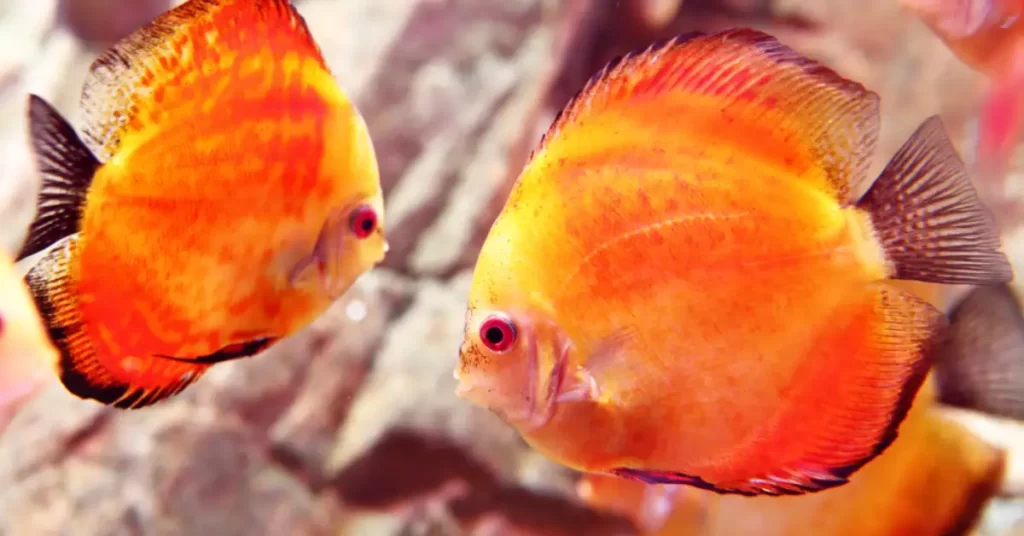Discus fish, with their vibrant colors and unique body shape, is often considered the crown jewel of the freshwater aquarium world.
However, their care requirements have led to a perception that they are challenging to maintain. But is this reputation justified?
In this article, we’ll explore the intricacies of keeping discus fish and provide practical advice for those considering adding these beautiful creatures to their aquarium.
Understanding Discus Fish: Origins and Characteristics
The Amazonian Origins
Discus fish are native to the Amazon River Basin in South America, where they thrive in soft, acidic, and slow-moving waters.
Their habitat is characterized by dense vegetation, which provides cover and supports a diverse range of aquatic life.
Physical Features
These fish are known for their round, flat bodies and large, saucer-like fins.
They come in a variety of stunning colors, including blues, reds, greens, and yellows, as well as different patterns, such as striped or spotted.
The Myth of Difficulty: Are Discus Fish Really Hard to Keep?
The perceived difficulty in keeping discus fish healthy can be attributed to their specific water parameter requirements and sensitivity to changes in their environment. However, with proper care and attention, these fish can thrive in a home aquarium.
Water Parameters
Discus fish require clean, warm water with a stable temperature between 82°F and 86°F.
The pH should be slightly acidic, ranging from 6.0 to 7.0, and water hardness should be low. Maintaining these parameters is essential for the health and well-being of your discus fish.
Filtration and Water Changes
Proper filtration is crucial to maintaining water quality. Using a high-quality filter that can handle both mechanical and biological filtration is highly recommended.
Regular water changes (20-30% weekly) are also necessary to remove waste and maintain water quality.
Tank Setup and Decor
A well-planned tank setup is essential for discus fish. Provide ample hiding spots with live plants, driftwood, and rock formations.
The tank should be at least 50 gallons for a small group of discus, with an additional 10 gallons per additional fish.

Diet and Nutrition: Feeding Your Discus Fish
Discus fish are omnivorous and require a varied diet to remain healthy. Offer high-quality, protein-rich foods like flakes, pellets, and frozen or live foods such as brine shrimp and bloodworms. Feeding two to three times a day in small amounts is recommended.
Keeping Discus Fish Healthy: Common Diseases and Prevention
Common Diseases
Discus fish are prone to several diseases, such as discus plague, ich, and Hexamita. Early detection and treatment are crucial for the survival of your fish.
Preventing Illness
Maintaining a clean and stable environment is the best way to prevent disease in your discus fish.
Regular water changes, proper filtration, and a balanced diet can go a long way in keeping your fish healthy.
Tank Mates: Choosing Compatible Fish for Your Discus Aquarium
Discus fish are generally peaceful and can coexist with other peaceful, slow-moving fish. Ideal tank mates include cardinal tetras, corydoras catfish, and small plecos.
Avoid aggressive or fin-nipping species that may stress your discus fish.
Breeding Discus Fish: A Rewarding Challenge
Breeding discus fish can be a rewarding experience, but it requires dedication and patience.
Provide a separate breeding tank with proper water parameters, and offer a nutritious diet to encourage breeding behavior. Once eggs are laid, monitor the fry closely and provide them with appropriate food.
FAQs
Can discus fish be kept with other fish species?
Yes, discus fish can be kept with other peaceful, slow-moving fish that share similar water parameters. Suitable tank mates include cardinal tetras, corydoras catfish, and small plecos. Avoid aggressive or fin-nipping species.
How often should I feed my discus fish?
Discus fish should be fed two to three times a day in small amounts. Offer a variety of high-quality, protein-rich foods such as flakes, pellets, and frozen or live foods like brine shrimp and bloodworms to ensure a balanced diet.
What size tank do discus fish require?
A minimum of 50 gallons is recommended for a small group of discus fish, with an additional 10 gallons per additional fish. This allows for adequate swimming space and proper maintenance of water parameters.
Conclusion
While discus fish have a reputation for being difficult to keep, with proper care and attention, they can thrive in a home aquarium.
By maintaining stable water parameters, providing a balanced diet, and ensuring a suitable tank setup, you can enjoy the beauty and elegance of discus fish in your own home.
The rewards of keeping these stunning fish far outweigh the challenges, making them a worthwhile addition to any freshwater aquarium for dedicated aquarists.